|
The Chinook or KING of the Salmon
Chinook spawning grounds extend from 10 - 1,000
miles inland. The early runs make the longest journey. Most young chinook fry go to sea very soon after hatching, but
others remain in a lake or river for 1 to 2 years before making their way downstream.
Chinook are hard to see in the spawning grounds becasue they
choose deeper water for spawning. Unlike the other salmon, their body shape does not change much during spawning season. The
color turns from bright silver to a dark brown, sometimes going black. Males and females are almost the same, except
the males are bigger.
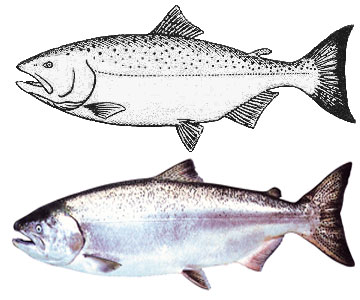
Coho's are the Fun Game of the Rivers.
They are also Known as Silvers.
Coho's are sometimes known
as silvers. They are the most popular game fish of the salmon family. Adult coho migrate up the Alaskan rivers around August. They choose streams close to the ocean.
Young coho
remain in their spawning stream for a full year after coming from the gravel. After living in the stream for a
year, they go to sea where they feed for 16 to 18 months. Their age when full grown is three years.
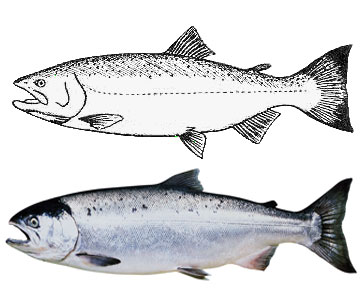
Sockeye are the BIG Money Fish. They
are also Known as the Red
Sockeye spawn in streams. They
swim into lakes where they stay for one to three years. From
May to June young sockeye fingerlings leave their lake and go to the sea. They go thousands
of miles into the Gulf of Alaska and the North Pacific where they fatten up. In their third year at sea they begin sexual
development and between their fifth and sixth year they return to where they were born. Full grown
sockeye average six pounds and can reach 12 pounds.
The males
have a hump on their back and the females keep thier normal shape when they spawn. Both sexes turn from their
normal silver color to different shades of red when they reach the spawning streams.
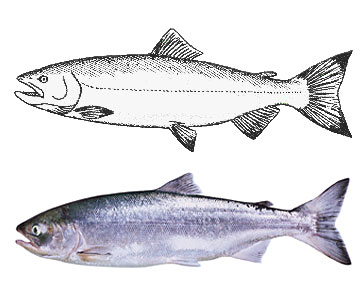
Chum: Even Though it's Called a Dog, it Can't Guard
Your House at Night
Chum salmon, also known as dog salmon, generally spawn in
early winter. Spawning grounds are usually along the coast, no more than 100 miles inland.
Eggs are laid in gravel from December to February. The
fry hatch in the spring. They go directly to sea. In the third or fourth year the chum is full grown,
weighing from 8 to 18 pounds.
On the spawning grounds chums have dark lines on
their sides. Color are black and gray to a dark red hue when spawning. Males develop a hooked nose and
large dog-like teeth. Females have dark lines along their sides but do not have the hooked nose.
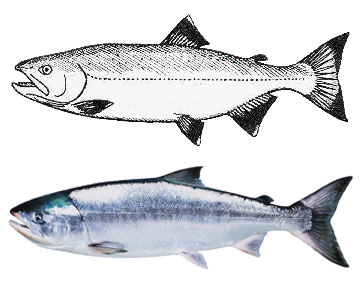
Pink - How do They Get that Hump into a Can? Pinks
are also Known as Humpies
Pink salmon, also known as humpies, live only two years.
Adults leave the ocean in the summer and fall and usually spawn in streams not fed by lakes. In the winter the tiny
one-inch fry drift directly downstream to the sea as soon as they are hatched from the gravel. Except for their
time in the gravel, they spend their entire two years in the rich ocean feeding areas. Their ocean growth is very fast with
average weights from three to six pounds when full grown.
On the spawning grounds the males get
a hump on their backs. Females do not change their body shape. Both sexes change color from bright silver to gray
on the back with a white to yellowish belly.
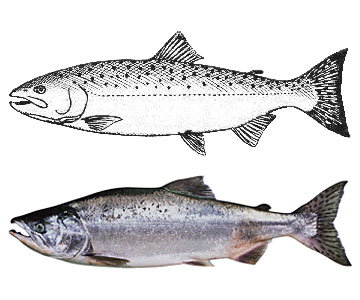
|

